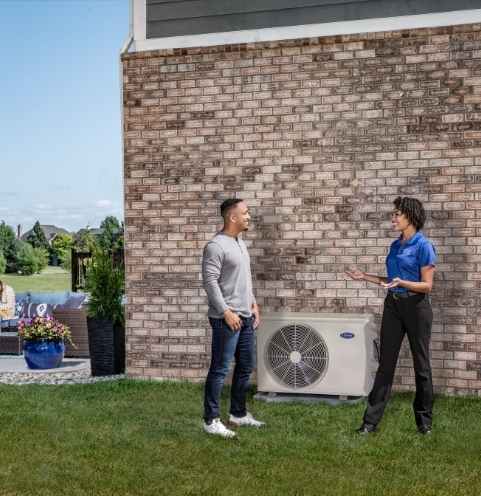Data-Driven Climate Control: Reduce Energy Consumption by Up to 75% While Maintaining Optimal Comfort
400% More Efficient Than Oil Heating Systems
Based on verified field data from Pennsylvania installations, Carrier ductless heat pumps deliver up to 4x the efficiency of traditional oil heating systems and operate effectively down to -22°F.
Real-World Performance Metrics: Conyngham, PA Case Study
- $1,500 Annual Oil Heating Savings Documented by the homeowner over a 2-year period.
- $40-50 Monthly Electric Increase: Net savings: $1,020-$1,080 annually.
- 2-3 Years ROI Period: The system pays for itself through energy savings.
- 4 Hours: Total Installation Time”: Minimal disruption to daily operations.
Verified Customer Results: 5-Year Performance Data
“Our electric bill has increased maybe $40 a month, some months $50. But what we saved on oil was phenomenal. I’m saving like $13, $14, $1500 on oil. So it’s just a matter of a couple of years, the system will pay for itself.”
Installation Details:
- Replaced oil heat + 3 window AC units
- 3-zone Carrier ductless heat pump system
- Single-day installation including electrical work
- 2+ years of trouble-free operation
"So Much Better!"
I never thought my second floor could ever be this good! Everyone gets to set the temperature in their own room.
Barbara S.
Allentown, PA
"The Finishing Touch"
After a renovation, our first floor never felt right anymore. The Carrier mini split solved that problem instantly.
Jon T.
Cherry Hill, NJ
"So Quiet!"
After using window air conditioners for years, I couldn't believe how quiet our Carrier ductless mini-split is! We stay cool, we can talk and watch TV and sleep in peace!
Kristen M.
New Castle, DE
"Fast Installation"
Our contractor was in and out of our home in a day and they left the place spotless. This was the easiest experience I've ever had with a contractor.
Bill F.
Richboro, PA
"Lower Electric Bills!"
We used to put aside extra money for gas in the winter and electric in the summer. Not anymore! I can't believe how well these work and how much lower our bills are now.
Natasha K.
Lehighton, PA
Return on Investment Calculator
Based on Conyngham, PA Case Study Data:
- Average System Cost: $5,500-$8,000 (single zone)
- Annual Oil Savings: $1,500
- Annual Electric Increase: $480-$600
- Net Annual Savings: $900-$1,020
- Payback Period: 5.4-8.9 years
- 20-Year Net Savings: $10,000-$12,400
Note: Calculations exclude available federal tax credits and utility rebates which can reduce initial investment by up to 30%.
Request Your Custom Energy Efficiency Analysis
Select your local Carrier Factory Authorized Dealer to receive:
- Detailed BTU load calculations for your specific space
- Energy consumption comparison analysis
- ROI projections based on your current energy costs
- Available rebates and tax credit documentation
What is the Process?
- Select your contractor in the form at the top of this page and share your contact information.
- Your Carrier Authorized contractor will come to your home and assess your situation.
- Your contractor will provide you with a detailed estimate.
- Most single-zone installations take less than one day to complete.
- Be perfectly comfortable.
It really is that simple.


Frequently Asked Questions: Technical Analysis
Q: How do heat pumps achieve 400% efficiency?
A: Heat pumps move thermal energy rather than creating it through combustion. For every 1 kW of electrical input, they can transfer up to 4 kW of thermal energy, achieving a Coefficient of Performance (COP) of 4.0. This is physically possible because they’re harvesting existing heat from outdoor air, not generating it from fuel.
Q: What’s the actual electrical load increase?
A: Based on field data, expect 20-25 kWh daily consumption during peak heating/cooling seasons. At $0.10/kWh, this translates to $60-75 monthly increase, offset by elimination of oil costs averaging $125-150 monthly.
Q: How does dehumidification efficiency compare?
A: Carrier ductless systems remove 4x more moisture than window units due to variable-speed operation and larger coil surface area. This improved latent heat removal enhances comfort at higher thermostat settings, further reducing energy consumption.
Still have Questions?
- How much does a ductless mini-split system cost? The total cost depends on system size, number of zones, brand, and installation complexity. Typically ranges from $5,000-$8,000 for a single-zone system, including installation.
- How energy efficient are ductless systems? Very efficient – most have SEER ratings of 16-30+ (compared to 13-18 for traditional systems), potentially saving 30-40% on cooling costs.
- Can a ductless mini-split both heat and cool? Yes, most are heat pumps that provide both heating and cooling from a single system.
- How many rooms can one outdoor unit handle? Depends on the system, but typically one outdoor unit can support 2-8 indoor units (zones).
- How long do ductless mini-splits last? With proper maintenance, 15-20 years (often longer than traditional HVAC systems).
- How difficult is the installation? Installation typically takes 1 day and requires professional installation, though it’s much less invasive than adding ductwork.
- What maintenance is required? Regular filter cleaning (easy for the owner), professional maintenance annually.
- Do ductless systems qualify for rebates or tax credits? Yes, you will save thousands with utility rebates, manufacturer rebates, and federal tax credits.
- How noisy are ductless systems? Very quiet – indoor units typically operate at 19-40 decibels (quieter than a library).
- How does the cooling/heating capacity compare to window units or central air? More powerful and efficient than window units, comparable to central air but with zone-specific control.
- Can ductless mini-splits be installed in any home? Yes, they work in virtually any home type, making them ideal for older homes, additions, converted spaces, or new construction.
- How visible are the indoor units? Indoor units are typically wall-mounted and compact (about 3 feet wide and 1 foot tall), though floor-standing and ceiling-recessed options exist.

